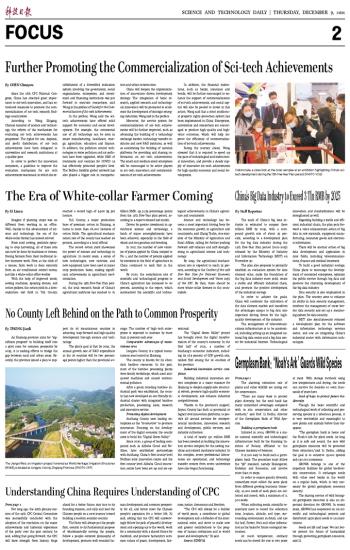
 No County Left Behind on the Path to Common Prosperity
No County Left Behind on the Path to Common Prosperity Further Promoting the Commercialization of Sci-tech Achievements
Further Promoting the Commercialization of Sci-tech Achievements The Era of White-collar Farmer Coming
The Era of White-collar Farmer Coming China's Big Data Industry to Exceed 3 Tln RMB by 2025
China's Big Data Industry to Exceed 3 Tln RMB by 2025 Germplasm Bank: ‘Noah's Ark’ Guards Wild Species
Germplasm Bank: ‘Noah's Ark’ Guards Wild Species Understanding China Requires Understanding of CPC
Understanding China Requires Understanding of CPC
Germplasm, also known as living genetic resources, are seeds or tissues that are maintained for animal and plant breeding, preservation and other research uses. They may exist in the form of seed collections stored in seed banks or trees growing in nurseries. Germplasm collection plays an important role in the maintenance of biological diversity and food security.
The Germplasm Bank of Wild Species (GBOWS), located in Kunming, southwest China's Yunnan province, has preserved more than 10,000 types of wild plant seeds as of 2020, accounting for 36 percent of the country's plant species.
Known as Asia's largest "Noah's Ark" for wild species, it is a comprehensive national database for the collection and preservation of germplasm resources, including seed banks, in vitro plant banks, DNA banks, microbial banks and animal germplasm banks.
After a decade's development, GBOWS has become a leader in the protection of global biodiversity together with the Millennium Seed Bank in the UK and the Svalbard Global Seed Vault in Norway.
Preventing the loss of biodiversity and germplasm resources
Seeds are the starting point of a plant's life. The protection and utilization of seed resources are particularly significant when biodiversity is threatened.
Since 1900, nearly three species of seed-bearing plants have disappeared each year, which is 500 times faster than they would naturally. The report, State of the World's Plants and Fungi 2020, has shown that 40 percent of the world's plants are at risk of extinction.
The alarming extinction rate of plants and other wildlife are crying out for conservation.
"There are many ways to protect plant diversity, but the seed bank has many unmatched advantages compared with in situ conservation and other methods," said Prof. Li Dezhu, director of the Germplasm Bank of Wild Species.
Building a germplasm bank
Initiated in 2004, GBOWS is a major national scientific and technological infrastructure built by the Kunming Institute of Botany, affiliated to the Chinese Academy of Sciences.
It is not easy to build such a germplasm bank. The procedure must follow the "3E" standard, namely Endangered, Endemic and Economic, and involve more than 70 steps.
In order to ensure genetic diversity, researchers must collect the same plant from different growing locations. Generally, 10,000 seeds of each plant are collected and stored, with a minimum of 2,500 seeds.
When collecting seeds, scientific researchers need to record the collection time, location, altitude, soil type, surrounding environment in detail, and use the leaf, flower, fruit and other information as the basis for future ecological restoration.
At room temperature, ordinary seeds can be stored for one to two years at most. With storage methods using low temperatures and drying, the seeds can survive for decades or even thousands of years here.
Seed of hope to protect future biodiversity
Though the basic scientific and technological work of collecting and preserving species is a laborious process, it is very worthwhile and meaningful to save plants and animals before they disappear.
"The germplam bank is home and the Noah's Ark for plant seeds. As long as it is safe and sound, the rare wild germplasm resources will be protected from extinction,"said Li Dezhu, adding the goal is to conserve 19,000 species and 190,000 accessions.
GBOWS belongs to one of the important facilities for global biodiversity conservation. It exchanges seeds with other seed banks in the world on a regular basis, which is very necessary for global germplasm resources security.
The sharing service of wild biological germplasm resources is also an important direction for GBOWS. In recent years, GBOWS has cooperated on 161 scientific and technological projects and distributed 13179 plant seeds to 124 institutions.
Seeds are life and hope. We can better protect the future of humankind through protecting germplasm resources,said Li.


 Next
Next



